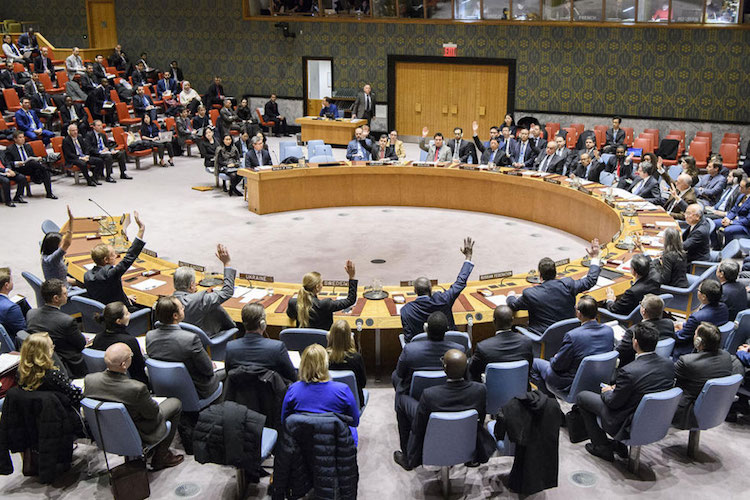By J Nastranis
UNITED NATIONS (IDN) – The United Nations Secretary-General António Guterres desires to make 2018 “a pivotal year” for the achievement of sustainable peace on the Korean Peninsula.
In a statement attributable to his spokesperson, following the adoption of a new Security Council resolution (UNSCR 2397), he said: “The only way forward for a comprehensive peaceful and political solution requires de-escalation and open communication channels, now.”
The resolution was approved on December 22 in response to the latest intercontinental ballistic missile (ICBM) launch by the Democratic People’s Republic of Korea (DPRK), widely known as North Korea, on November 28.
The Secretary-General welcomed “the continued unity of the Security Council,” which he said, “is essential to achieve the goal of denuclearisation and create the space for diplomatic initiatives aimed at achieving it in a peaceful manner.”
According to the statement, the Secretary-General supports the Security Council’s desire for a peaceful, diplomatic and political solution to the situation, as well as its urging of further work to reduce tensions.
“He reaffirms his commitment to working with all parties to this end. He calls upon all Member States to ensure the full implementation of the relevant Security Council resolutions and to redouble efforts to make 2018 a pivotal year for the achievement of sustainable peace on the Korean Peninsula,” the statement added.
The Security Council’s new sanctions aim at increasing the depth of measures imposed on the country in the wake of its continued nuclear and ballistic weapons programme, including the latest ballistic missile launch.
In a unanimously adopted resolution, the 15-member Council decided to limit the DPRK’s imports of refined petroleum to 500,000 barrels for 12 months starting on January 1, 2018, with crude oil capped at the current levels for that period.
The Council resolved in particular to “prohibit the direct or indirect supply, sale or transfer to the DPRK, through their territories or by their nationals, or using their flag vessels, aircraft, pipelines, rail lines, or vehicles and whether or not originating in their territories, of all crude oil, unless the [Security Council’s Sanctions] Committee approves in advance on a case‑by‑case basis a shipment of crude oil which is exclusively for livelihood purposes of DPRK nationals and unrelated to the DPRK’s nuclear or ballistic missile programmes or other activities prohibited by resolutions 1718 (2006), 1874 (2009), 2087 (2013), 2094 (2013), 2270 (2016), 2321 (2016), 2356 (2017), 2371 (2017) and 2375 (2017) or this resolution.”
The Council further decided “that this prohibition shall not apply with respect to crude oil that, for a period of twelve months after the date of adoption of this resolution, and for 12-month periods thereafter, does not exceed 4 million barrels or 525,000 tons in the aggregate per twelve month period.”
Furthermore, the Council asked all Member States supplying crude oil to North Korea to report to the Sanctions Committee “every 90 days from the date of adoption of this resolution [December 22, 2017] of the amount of crude oil provided to the DPRK.”
The Security Council also decided that Member States shall repatriate all DPRK nationals earning income in that Member States’ jurisdiction and all DPRK government safety oversight attachés monitoring DPRK workers abroad “immediately but no later than 24 months,” unless the Member State determined that the national’s repatriation is prohibited under applicable national and international law, or if that national is a national of that Member State.
Further, in relation to maritime interdiction of cargo vessels, the Council decided that Member States shall seize, inspect, and impound any vessel in their ports if the Member State has reasonable grounds to believe that the vessel was involved in activities, or the transport of items, prohibited by relevant UN resolutions.
According to the New York Times, “Although the resolution won backing from all 15 council members, the weakened penalties reflected the power of Russia and China. Both had objected to the original language calling for an oil embargo and other severe penalties — with President Vladimir V. Putin of Russia declaring last week that such additional sanctions would be counterproductive and possibly destabilizing.
“Either could have used their status as permanent members of the Security Council to veto the measure.”
On the political side, the Security Council expressed its “deep concern” at the grave hardship that the people in the DPRK are subjected to and condemns the country for pursuing nuclear weapons and ballistic missiles instead of the welfare of its people.
Earlier, while expressing his profound concern over the risk of military confrontation on the Korean Peninsula, “including as a result of miscalculation,” Guterres stressed the need to disassociate the peace and security situation in the DPRK from the humanitarian needs in the country.
Seventy per cent of the country’s population is affected by food insecurity and 40 per cent are malnourished and some $114 million is needed to meet urgent requirements. However, the 2017 DPRK Humanitarian Needs and Priorities appeal is only 30 per cent funded, he told the Security Council on December 15.
In the resolution adopted on December 22, the Council affirmed that it shall keep the country’s actions under “continuous review” and that it is determined to take further “significant measures” in the event of a further nuclear test or launch.
Releasing the full text of the new resolution, the U.S. Permanent Mission to the UN said: The Security Council resolution (UNSCR) 2397 imposes strong new sanctions on North Korea’s energy, export, and import sectors with new maritime authorities to help shut down North Korea’s illicit smuggling activities. UNSCR 2397 builds on UNSCR 2375 (2017), which included the strongest sanctions ever imposed on North Korea, and prior resolutions. [IDN-InDepthNews – 26 December 2017]
Photo: The Security Council unanimously adopts resolution 2397 (2017), condemning in the strongest terms the ballistic missile launch conducted by the DPRK on 28 November 2017 in violation and flagrant disregard of the Security Council’s resolutions on non-proliferation. UN Photo/Manuel Elias
IDN is flagship agency of the International Press Syndicate.
facebook.com/IDN.GoingDeeper – twitter.com/InDepthNews

